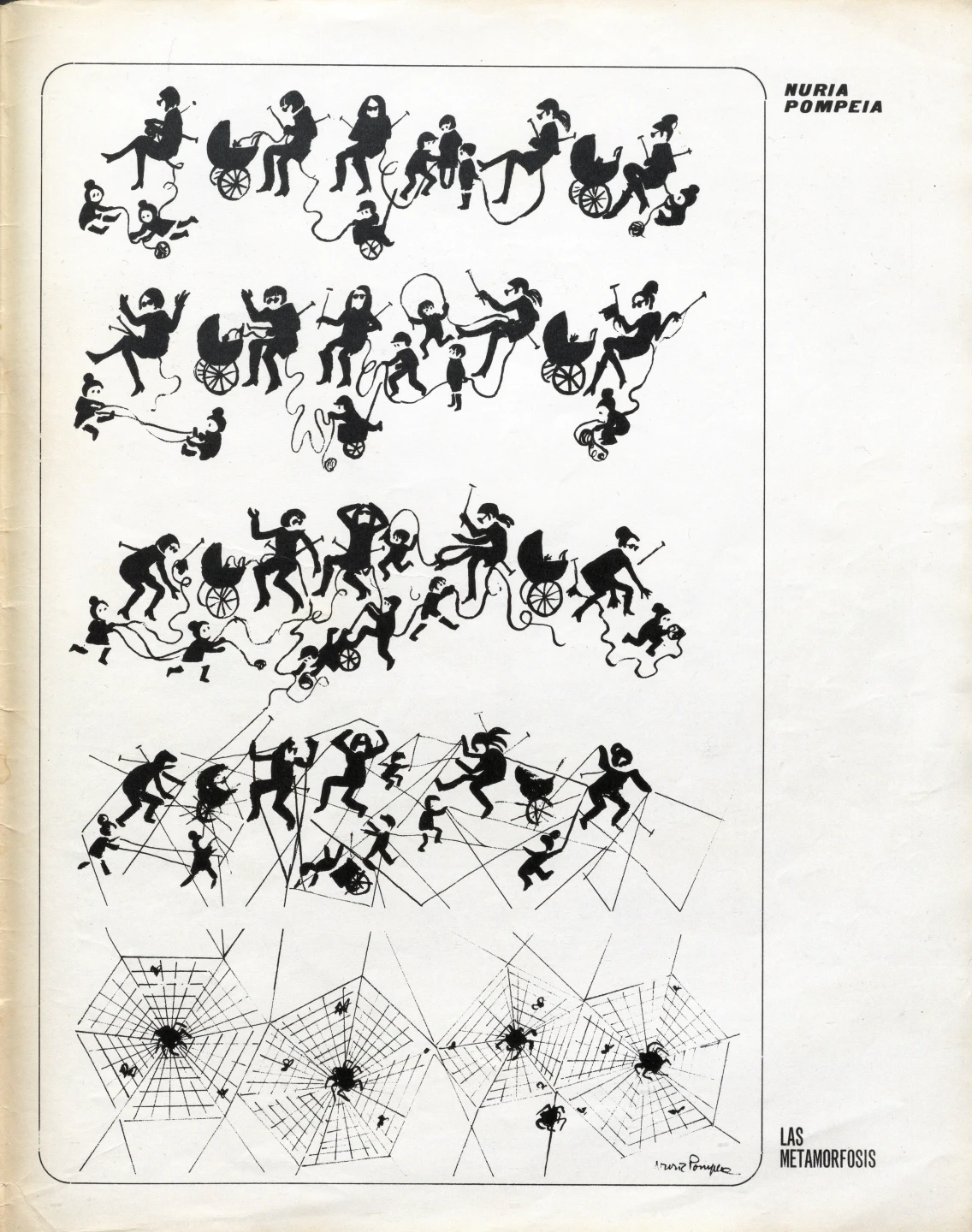
Las metamorfosis (The Metamorphoses), Nuria Pompeia, 1968
The Crossed Vignettes conference analyses the authorship of comics created by women from an intergenerational perspective and draws from the Museo Reina Sofía Collections. Across different round-table discussions, the programme features the participation of illustrators Marika, Carla Berrocal, Laura Pérez Vernetti and Bea Lema and researchers Viviane Alary, Virginie Giuliana and Elisa McCausland.
The aim of the encounter is twofold: to explore in greater depth the different forms in which women comic book artists have contributed to developing a counterculture; namely, the appearance of ruptures, reformulations and new genres within the ninth art. And to set up a dialogue which ignites an exploration of genealogies linking different generations of artists.
Moreover, the activity is put forward as a continuation to the exhibition Young Ladies the World Over, Unite! Women Adult Comic Book Writers (1967–1993) and the First International Conference on Feminist Comic Book Genealogies, held in April 2024 at the Complutense University of Madrid.
In redefining the visual narratives of the comic book and questioning gender stereotypes in a male-dominated world, women comic book writers and artists have impelled greater visibility and a more prominent role for women in this sphere. The study of intergenerational dialogue between female artists past and present enables an analysis of the way in which these voices reinterpret and carry the legacy of their predecessors, contributing new perspectives, forms of artistic expression and a gender-based hybridisation which enhances the world of comics.
The conference, organised jointly by the Museo Reina Sofía and Université Clermont Auvergne/CELIS (UR4280), features the participation of the Casa de Velázquez and is framed inside the context of the CALC programme The Spanish Artistic Canon. Between Critical Literature and Popular Culture: Propaganda, Debates, Advertising (1959–1992), co-directed by Virginie Giuliana. It is also the outcome of the projects Horizon Europa COST Actions iCOn-MICs (Comics and Graphic Novels from the Iberian Cultural Area, CA19119) and COS-MICs (Comics and Sciences, CA24160).
Acknowledgements
Acknowledgements
Organised by
Museo Reina Sofía
Collaboration

Agenda
viernes 21 nov 2025 a las 17:30
Presentation
Introduction to the research projects iCOn-MICs/WGAS/UCA-Reina Sofía, COST COS and CALC/Casa de Velázquez, and the holdings of comic books created by women in the Museo Reina Sofía’s Library and Documentation Centre
— Conducted by Viviane Alary, Virginie Giuliana and Elisa McCausland.
viernes 21 nov 2025 a las 18:15
Women Comic Book Writers: Rethinking and Deconstructing Gender
Round table
—With comic artists: Marika Vila and Carla Berrocal. Moderated by Viviane Alary and Elisa McCausland.
viernes 21 nov 2025 a las 19:00
Break
viernes 21 nov 2025 a las 19:15
The Comic as a Space of Expression, Encounter and Reinvention for Women Artists
Round table
—With comic artists Laura Pérez Vernetti and Bea Lema. Moderated by Virginie Giuliana.
Participants
Laura Pérez Vernetti
is a comic book writer, illustrator and photographer with a degree in Fine Arts. She entered the world of comics in 1981, contributing to the underground magazine El Víbora, before moving into adapting the work of literary figures and poets to experimental, political and erotic comics. Among other books, she has published El toro blanco (The White Bull, 1989) and Las habitaciones desmanteladas (The Dismantled Rooms, 1999), works in which she adapts literary authors such as Maupassant, Thomas De Quincey and Dylan Thomas.
Pérez Vernetti is a pioneer in the new genre of graphic poetry, publishing nine comics in this new language with the publishing houses Luces de Gálibo, Reino de Cordelia and Centro Cultural Generación del 27. She has shown her work at the Fundación Joan Miró in Barcelona, the Museo Es Baluard in Palma de Mallorca, the Musée de la Bande Dessinée in Angoulême (France), the Artium in Vitoria and at the Museo Reina Sofía in Madrid. Further, she has received numerous awards, for instance the Trueno de Honor Prize in 2017, the Grand Prize at the 36th Barcelona International Comic Book Convention in 2018 and, more recently, the “A Life of Vignettes” Award at the Salón SPLASH de Sagunto in 2025, the same year she published Insólitos. Poesía Gráfica.
Mari Carmen Vila (Marika)
is a graphic artist, illustrator and comic book writer, and a researcher specialised in gender studies, a lecturer at the Universitat Autònoma de Barcelona, UAB), a columnist, and a comic critic for the magazine Serra D’Or. She is also a coordinator of publications, an exhibition curator and disseminates, from activism, the feminist gaze on language. She is one of the first artists to add an avant-garde and feminist gaze to the discourse of the Spanish adult comic book.
Marika Vila started out in the profession in 1970 as an illustrator and comic book draughtswoman with different publications in Europe (London, IPC Magazines; Scotland, DC Thomson; Italy; and Sweden). In 1975 she started working as a feminist comic book artist with an array of leading adult comic book publications that surfaced in the Transition to democracy in Spain. More recently, she has published the graphic novels Mata Hari (Isla de Nabumbu, 2nd ed., Island of Nabumbu, 2023) and Moderna Secreta (hija de Morgana) [Modern Secret, (Morgana’s Daughter), Marmotilla, 2025].
In 2017, her research culminated in the doctoral thesis El cuerpo ocupado. Iconografías del cuerpo femenino como espacio de la transgresión masculina en el cómic (The Occupied Body. Iconographies of the Female Body as a Space of Male Transgression in Comics, Universitat de Barcelona, UB, 2017), leading to the touring exhibitions Mujeres cuerpo a cuerpo (Women Body to Body, Museo del Cómic de Sant Cugat, 2019/Tenerife, 2020) and Cossos que parlen. Les representacions del cos en les autores del còmic espanyol (1910-2023) for the Barcelona Local Museums Network (DIBA), in addition to the theory book Desokupar el cuerpo. Las voces de las autoras en el cómic español (De-occupying the Body. The Voices of Women Artists in Spanish Comics, Marmotilla, 2024).
Currently, she combines research, teaching, criticism and theoretical dissemination with illustrations and comics.
Carla Berrocal
studied Illustration and Graphic Design at the N.10 School of Arts and Crafts in Madrid. Since 2004 her work has centred around editorial illustration for publications and media outlets such as Eme21mag, eldiario.es and El País, and in the Vocento group. Moreover, she combines this work in the sphere of illustration and comics with feminist activism, teaching and dissemination, and is currently a contributor to Cadena SER’s talk show of graphic humourists, A vivir que son dos días.
Her early forays into comic books were as the draughtswoman of works in Hire. El terrible vampiro samurái (2004, with Daniel Hartwell) and Mad Trio (2005, with Jason DeGroot), while her first fully fledged solo work was in the volume Quattrocento (2006). In 2011 she published her first graphic novel, El brujo, inspired by popular culture in Chile, earning her widespread recognition among readers and critics. This was followed by the experimental comic Epigrafías (Epigraphs, 2016) on the life of American poet Natalie Clifford Barney. In 2021 she published her first book with Reservoir Books, the biographical investigation Doña Concha. La rosa y la espina (Doña Concha. Rose and Thorn), three years in the making. Her most recent graphic novel is La tierra yerma (Wasteland, 2024), marking a return to her much-loved adventure comic.
Bea Lema
is an illustrator and comic book writer. Her work is broadly autobiographical and explores issues related to madness, trauma, family relationships, religion and popular rites. Graphically, her work explores drawing and embroidery as a support for her illustrations and comic strips.
In 2022 she received a grant to carry out a graphic novel residency at the Maison des auteurs in Angoulême (France). In France, she has published France Des maux à dire (Sarbacane), in Spanish El Cuerpo de Cristo (Body of Christ, Astiberri), which was awarded the Jury Prize at the Festival BD 2023 in Pèrigord, the Audience Award at the 2024 Angoulême Festival, the 2024 Bédélys Award at the Montreal Comic Arts Festival for the best international work, the Grand Prize at the 2024 Heroína Madame Figaro, the 2024 National Comic Book Award and the 2025 Award for the Best International Graphic Novel at the Napoli Comicon Festival. She has recently adapted this book to a short animation film.
Viviane Alary
is a French Hispanist and an emeritus professor at Université Clermont Auvergne. She was the coordinator of the European Action COST iCOn-MICS (Investigation on Comics and Graphic Novels in the Iberian Cultural Area) until 2023 and is the co-founder of the PACE (The Academic Platform on Comics in the Spanish Language). Her current works focus on memory-based narrative in comics, the influence of the 1980s on today’s Spanish comic books, female authorship in comics and, in general, new trends in the contemporary comic strip. She is the coordinator of collective books like Narrativa gráfica de la Guerra Civil. Perspectivas globales y particulares (Graphic Narrative in the Spanish Civil War. Global and Individual Perspectives, Grafikalismos, 2020, publications service of the University of León), La historieta ibérica y la bande dessinée franco-belga: relaciones, intercambios (The Iberian Comic Strip and the Franco-Belgian bande dessinée: Relationships, Exchanges, Neuróptica 3, 2021, Prensas Universitarias de Zaragoza) and Renovación del cómic en español: lecturas de España a Hispanoamérica (Rekindling the Comic Book in Spanish: Readings from Spain to Hispanic America, GRIMH, col. Zoom, 2022).
Virginie Giuliana
is a Hispanist and a lecturer in Graphic Literature at Université Clermont Auvergne (France), and the director of the university’s Hispanic Studies Department and a member of the Centre de Recherches sur les Littératures et la Sociopoétique. She holds a PhD in Hispanic Studies and Art History from Université Lumière Lyon 2 (France) and the Université de Neuchâtel (Switzerland). From 2023 to 2025 she has been overseeing the European project iCOn-MICs “Investigation on Comics and Graphic Novels from the Iberian Cultural Area” (2020–2025) and has co-directed the CALC project “The Spanish Artistic Canon. Between Critical Literature and Popular Culture: Propaganda, Debates, Advertising (1959–1992)”, developed inside the framework of EHEHI–Casa de Velázquez (2024–2026). Furthermore, she develops and propels the European Project COST Action COS-MICs “Comics and Sciences through Multidisciplinary Investigation and Collaboration” (2025–2029). Her research centres on comics, including the fields of female authorship and digital comics, in addition to art history and museology.
Elisa McCausland
is a journalist and critic who conducts research into popular culture and its manifestations, with a deeper focus on film and comics. She also wrote, with Diego Salgado, Viñetaria. Historia universal de las autoras de cómic (Viñetaria. A Universal History of Women Comic Book Writers and Artists, Cátedra, 2024). With Salgado, she also curated the encounters and seminars Thyssen: The Ninth Passenger. Encounters with Comic Artists (Museo Nacional Thyssen-Bornemisza, 2024), Comics, Thought and Popular Culture (Círculo de Bellas Artes, 2023) and The B Side of Reality: Weird Feminism (La Casa Encendida, 2022). McCausland has also headed initiatives such as the Colectivo de Autoras de Cómic (The Collective of Women Comic Book Writers and Artists, 2013–present), the First Congress of Feminist Comic Book Genealogies (Complutense University of Madrid, 2024), the third edition of the Injuve Comic Book Conferences La alquimia de la viñeta (The Alchemy of the Vignette, 2024) and the first edition of the Madrid Comics Fair (2025). She is also the promotor and a member of the Chair of the University of Alcalá de Henares on Research and Comics Culture and, with the Comics Chair from the University of Valencia, has organised film and comics seminars.
![1. Marika Vila, Moderna secreta (hija de Morgana) [Modern Secret (Morgana’s Daughter)], 2025](https://recursos.museoreinasofia.es/styles/large_portrait/public/Actividades/marika%20vila.jpg.webp)
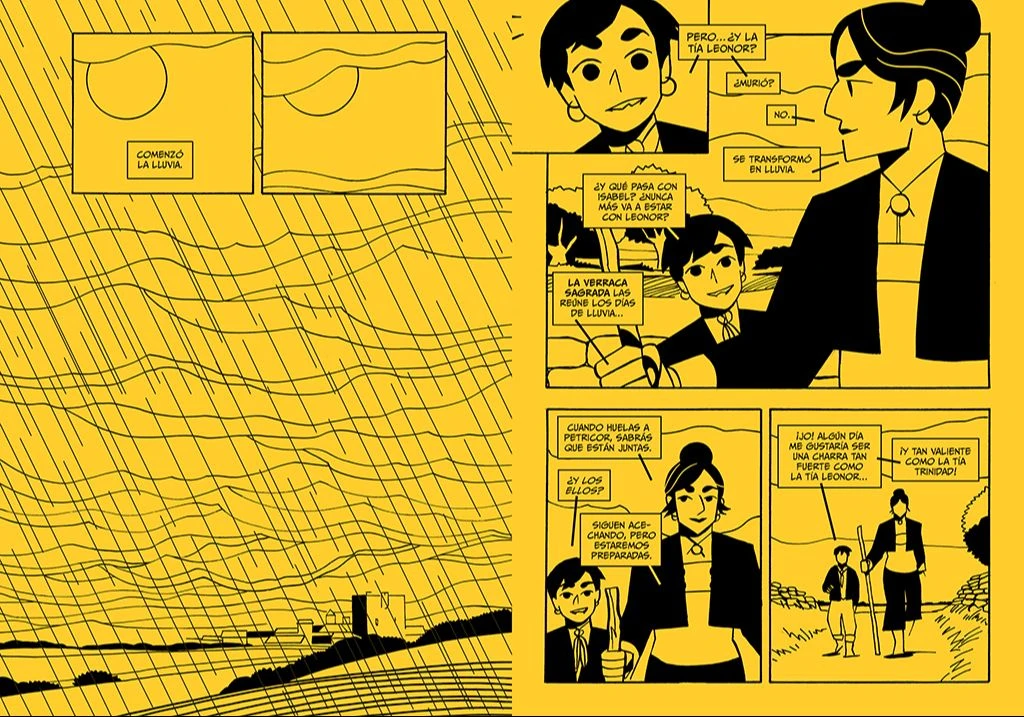
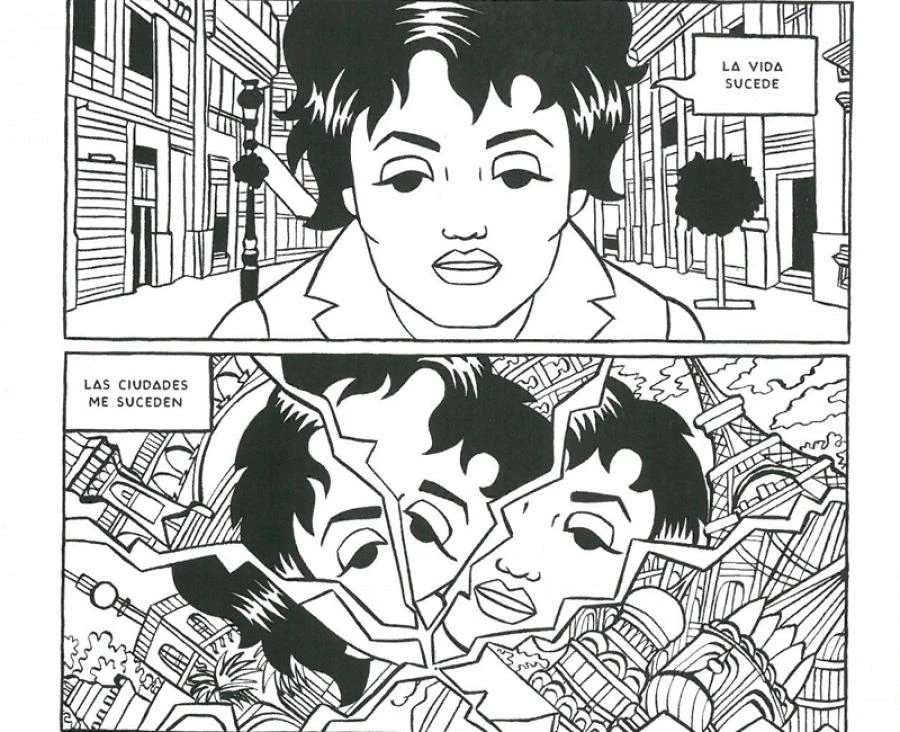
Más actividades
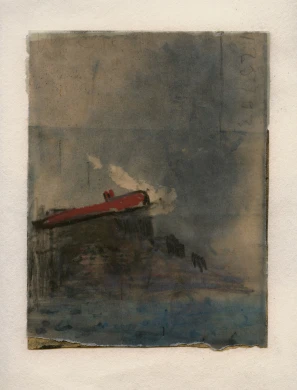
Juan Uslé. That Ship on the Mountain
Tuesday, 25 November 2025 – 7pm
Ángel Calvo Ulloa, curator of the exhibition Juan Uslé. That Ship on the Mountain, engages in conversation with artist Juan Uslé (Santander, 1954) in the Museo’s Auditorium 400 to explore in greater depth the exhibition discourse of this anthological show spanning four decades of Uslé’s artistic career.
The show casts light on the close relationship Uslé’s work bears to his life experiences, establishing connections between different stages and series which could ostensibly seem distant. Framed in this context, the conversation looks to explore the artist’s personal and professional journey: his memories, experiences of New York, his creative process, conception of painting, and ties with photography and film, and the cohesiveness and versatility that characterise his art. Key aspects for a more in-depth understanding of his artistic sphere.
The conversation, moreover, spotlights the preparatory research process that has given rise to this exhibition to grant a better understanding of the curatorial criteria and decisions that have guided its development.
These inaugural conversations, part of the main working strands of the Museo’s Public Programmes Area, aim to explore in greater depth the exhibition narratives of the shows organised by the Museo from the perspective of artists, curators and specialists.
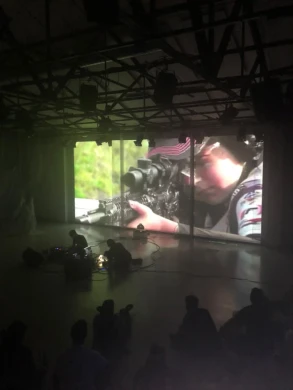
Fifteenth Edition of the Márgenes Festival
Sunday, 23 November 2025 - 7:30pm
This year’s opening night of the fifteenth edition of the Márgenes International Contemporary Film Festival will take place inside the Museo Reina Sofía. The inaugural session will witness artists Neutro Gris and Nodoaviom perform, live and for the first time, the multimedia performance Music 4 Salvation, which extends their language towards a sensorial experience fusing sound, image and digital emotion.
Music 4 Salvation unfolds as a sound and visual collage in which different strands are linked in one sole narrative of youth and adulthood, notions from which the piece puts forward a second reading of popular symbology and iconography and culminates by evoking the transitional time between these two stages of life. And all from a post-internet gaze and found footage aesthetics.
The Márgenes Festival is held from 23 to 30 November in Madrid and shines a light on innovative initiatives that combine up-and-coming and acclaimed talent. Its film programme explores the convergence of cinema, the visual arts and sound art with approaches that expand the limits of the film experience, encompassing screenings, audiovisual shows, performances, encounters and sessions for children. In addition to the opening event, the Museo also welcomes, among the organised activities this year, the series Emotional Interface. The Films of Metahaven.
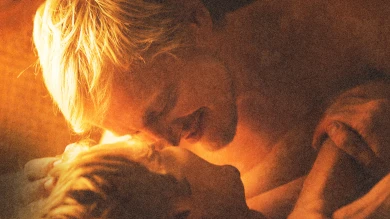
The Films of Ira Sachs
From Thursday, 20, to Sunday, 23 November 2025 – Check times
The International Festival of LGBTQIA+ Cinema in Madrid (QueerCineMad) and the Museo Reina Sofía come together to organise a retrospective on Ira Sachs (USA, 1965), a pivotal film-maker in contemporary queer cinema whose work has charted, across three decades, the affects, losses and resistance that traverse the lives of the LGBTQIA+ community. Sachs is the creator of a filmography which conceives of New York as the emotional architecture of his narratives, and as a space of memory, struggle and community. This programme includes the premiere of his most recent film, Peter Hujar’s Day (2025), in Madrid, with the film-maker in attendance in three of its sessions.
Sachs has filmed, with delicacy and conviction, the tensions between desire, precarity and belonging, from his first feature-length film, The Delta (1996), set on the margins of the Mississippi, to Love Is Strange (2014), where a gay couple have to give up their Manhattan apartment after marrying. In Keep the Lights On (2012) intimacy becomes a battleground in confronting addiction and neglect, while Lady (1994), a short film on the solitude of an elderly woman in New York, anticipates his sensibility for bodies made invisible. Last Address (2010) is a silent homage to queer artists who died from AIDS/HIV-related illnesses — Robert Mapplethorpe, Keith Haring, David Wojnarowicz — whereby the façades of the buildings they lived in become intimate monuments, the remnants of history erased through windows. Thus, Ira Sachs’s body of work engages in a profound dialogue with film-makers such as Rainer Werner Fassbinder in situating the gaze at the centre of bodies, in exploring the complexity of the struggle between himself and his films. Further, his practice reverberates through New Queer Cinema, a 1990s film movement that transformed the representation of sexuality from difference.
The director’s presence in Madrid, coupled with the premiere of his new work, makes this film season an event which extols both his career and his form of gazing and inhabiting the city from the queer, the community and the poetic. In these times of eviction and urban homogenisation, Sachs’s film-making reminds us that the neighbourhood can also be a gesture of care, a form of resistance, a future promise.
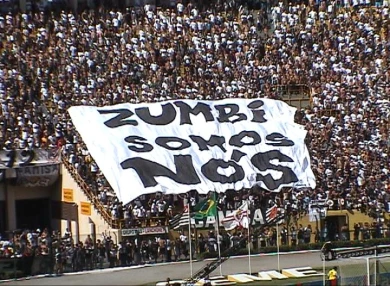
The History and Roots of Samba
Saturday, 22 November 2025 – 6pm
Museo Situado and the Maloka Brazilian Cultural Association come together to offer this artistic, historical and social activity in conjunction with Black Consciousness Day in Brazil, which pays homage to Dandara and Zumbi dos Palmares, universal symbols of Afro-Brazilian resistance and the fight against slavery.
In the activity, dance, poetry and performance become tools of memory and resistance via a programme which surveys the history of samba, from its origins in Bahia to its consolidation in Rio de Janeiro. It features the participation of more than ten Brazilian artists and pays homage to key figures in samba such as Tia Ciata, Clementina de Jesús, Cartola, Dona Ivone Lara, Elza Soares, Martinho da Vila and Alcione.
Further, the event seeks to shine a light on the richness of Afro-Brazilian culture while opening a space of reflection on resistance to racism throughout history and today, as well as inequality and disregard. In the words of philosopher Sueli Carneiro (2000), “the fight for the rights of black women and the community of African descent is inseparable from the rescue of history and the memory of our ancestors”. It is an artistic and vindicatory celebration that invites the whole community to aquilombarse: to come together, celebrate and affirm collective memory, for, as sociologist Florestan Fernandes (1976) affirmed, “the history of peoples of African descent can only be understood through the active resistance to oppression”. Long live Dandara. Long live Zumbi. Long live Afro-Brazilian ancestry.

Crossed Vignettes
Friday, 21 November 2025 – Check programme
The Crossed Vignettes conference analyses the authorship of comics created by women from an intergenerational perspective and draws from the Museo Reina Sofía Collections. Across different round-table discussions, the programme features the participation of illustrators Marika, Carla Berrocal, Laura Pérez Vernetti and Bea Lema and researchers Viviane Alary, Virginie Giuliana and Elisa McCausland.
The aim of the encounter is twofold: to explore in greater depth the different forms in which women comic book artists have contributed to developing a counterculture; namely, the appearance of ruptures, reformulations and new genres within the ninth art. And to set up a dialogue which ignites an exploration of genealogies linking different generations of artists.
Moreover, the activity is put forward as a continuation to the exhibition Young Ladies the World Over, Unite! Women Adult Comic Book Writers (1967–1993) and the First International Conference on Feminist Comic Book Genealogies, held in April 2024 at the Complutense University of Madrid.
In redefining the visual narratives of the comic book and questioning gender stereotypes in a male-dominated world, women comic book writers and artists have impelled greater visibility and a more prominent role for women in this sphere. The study of intergenerational dialogue between female artists past and present enables an analysis of the way in which these voices reinterpret and carry the legacy of their predecessors, contributing new perspectives, forms of artistic expression and a gender-based hybridisation which enhances the world of comics.
The conference, organised jointly by the Museo Reina Sofía and Université Clermont Auvergne/CELIS (UR4280), features the participation of the Casa de Velázquez and is framed inside the context of the CALC programme The Spanish Artistic Canon. Between Critical Literature and Popular Culture: Propaganda, Debates, Advertising (1959–1992), co-directed by Virginie Giuliana. It is also the outcome of the projects Horizon Europa COST Actions iCOn-MICs (Comics and Graphic Novels from the Iberian Cultural Area, CA19119) and COS-MICs (Comics and Sciences, CA24160).
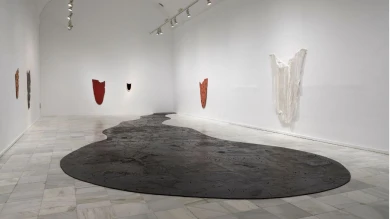
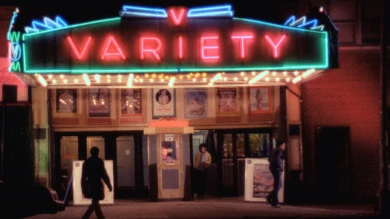
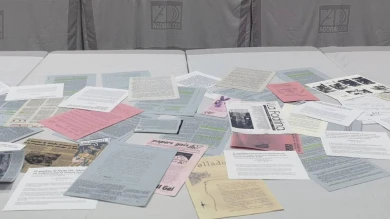
![Miguel Brieva, ilustración de la novela infantil Manuela y los Cakirukos (Reservoir Books, 2022) [izquierda] y Cibeles no conduzcas, 2023 [derecha]. Cortesía del artista](https://recursos.museoreinasofia.es/styles/small_landscape/public/Actividades/ecologias_del_deseo_utopico.jpg.webp)
![Ángel Alonso, Charbon [Carbón], 1964. Museo Reina Sofía](https://recursos.museoreinasofia.es/styles/small_landscape/public/Actividades/perspectivas_ecoambientales.jpg.webp)